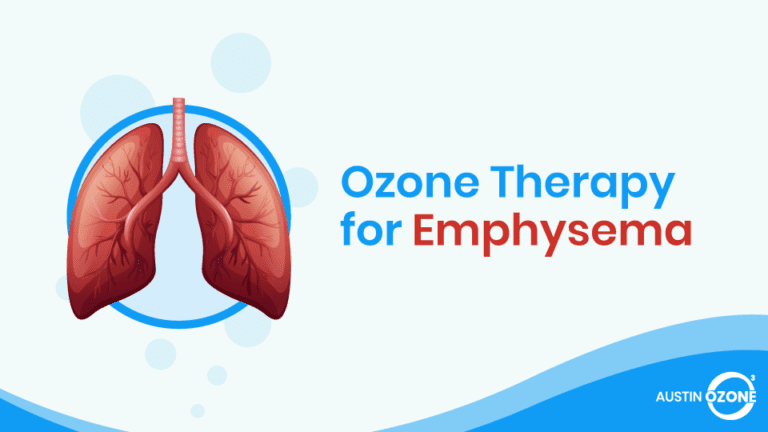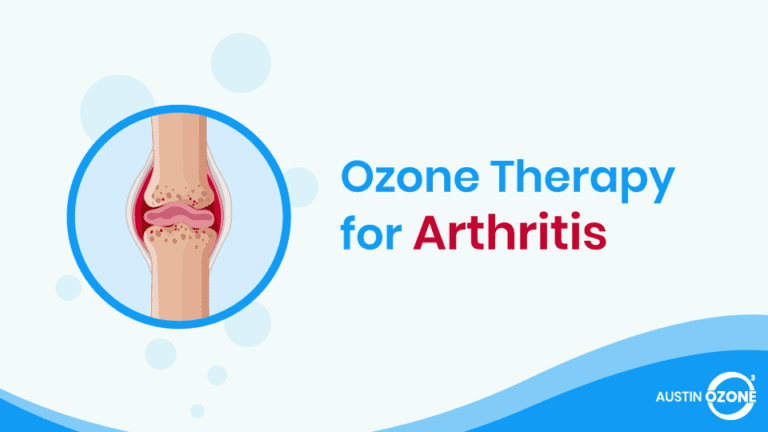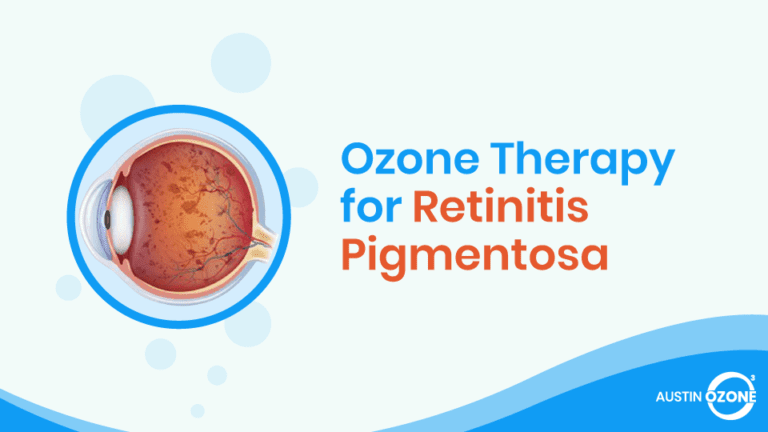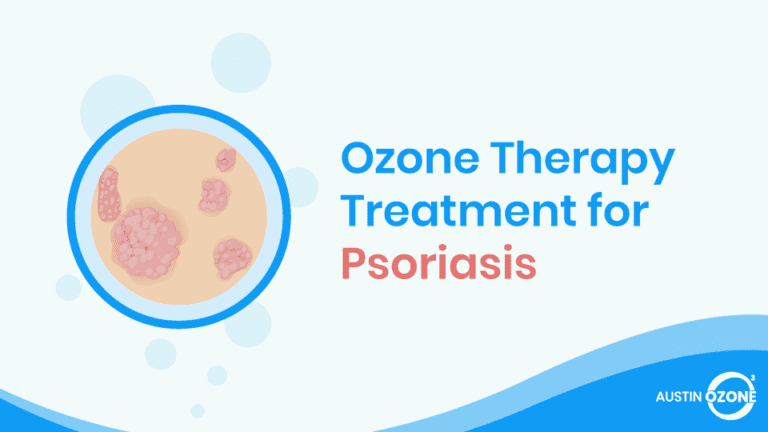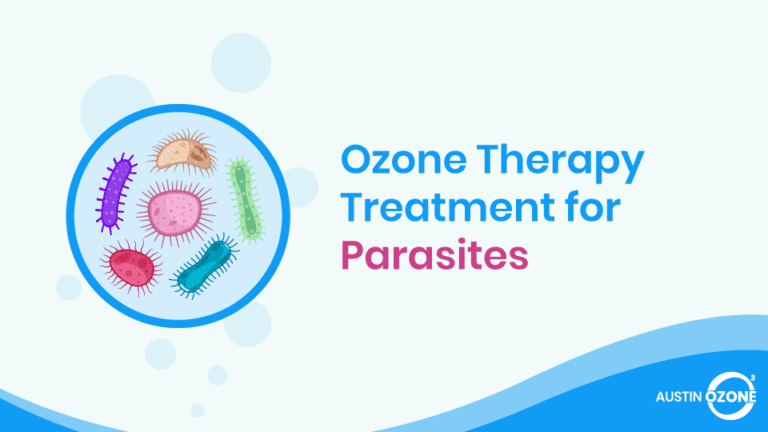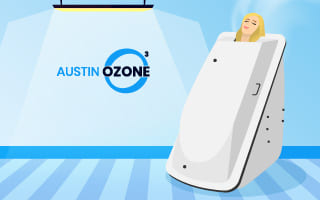Emphysema is a type of chronic obstructive pulmonary disease (COPD), a long-term lung disease that develops gradually and makes it hard to breathe. According to the American Lung Association1, emphysema affects over three million people in the US alone. Ozone therapy for Emphysema is a useful treatment.
Overview of COPD
COPD is a group of lung diseases that affects millions and is one of the leading causes of death in America1.
There are two types of COPD: chronic bronchitis and emphysema. Both involve the presence of damaged lung tissues, which decrease the oxygen level that flows through the bloodstream.
The symptoms of both types of COPD are almost identical , which is why you need to consult your doctor to determine the best treatment plan.
The good news is that emphysema is one of the most preventable diseases, as it is strongly linked to tobacco and cigarette smoking. However, it is incurable once you acquire it.
What Happens to Your Lungs When You Have Emphysema?
The respiratory system is a complex network of organs that help you breathe. It is mainly composed of your mouth, nose, sinuses, throat, trachea, bronchial tubes, and lungs. In healthy lungs, the airways and alveoli are elastic enough to make room for the air you breathe.
With emphysema4, the walls between the alveoli are damaged, causing these small bags to lose their elasticity and balloon-like shape. This gradually ruptures the alveoli and reduces the surface area where oxygen can be trapped. Eventually, breathing becomes extremely difficult.
What Are the Common Causes of Emphysema?
Emphysema is usually caused by long-term exposure to lung irritants. In many countries, cigarette smoke is the number one cause of emphysema, although pipe, tobacco, and cigar smoke can cause it, too.
The American Lung Association claims that 75% of people1 suffering from emphysema are either smokers or used to smoke. However, you don’t even need to be the one smoking – inhaling second-hand smoke can also lead to emphysema.
Emphysema is usually caused by long-term exposure to lung irritants. In many countries, cigarette smoke is the number one cause of emphysema, although pipe, tobacco, and cigar smoke can cause it, too.
Air pollution and chemical fumes or dusts can also cause emphysema. Air pollution is a mixture of gases, pollens, and mold spores suspended in the air. They can be found both inside and outside building structures and can affect your health.
If your work or environment exposes you to these dangerous fumes, then the risk of developing emphysema becomes great.
Lastly, some “inherit” emphysema-causing genes called alpha-1 antitrypsin deficiency (AATD). It is a protein produced by the liver to protect the lungs. If you have AATD, then you are likely to experience shortness of breath and wheezing. In severe cases, the patient might even be required to undergo a lung transplant to survive.
What Are the Common Symptoms of Emphysema?
Emphysema is characterized by the gradual destruction of your air sacs or alveoli. As such, the initial onset of this disease does not usually exhibit any symptoms.
The signs and symptoms of emphysema often take years to develop. When they do, the symptoms are very mild and can be mistaken for those of common cough or flu.
As the disease progresses, the patient may experience frequent coughing, wheezing, shortness of breath, and tightness around the chest area. They may also experience weight loss and muscle weakness, particularly around the lower limbs (i.e., legs, feet, ankles).
How to Diagnose Emphysema?
Smokers with a family history of emphysema are more likely to develop this disease. This is why doctors often ask for your medical and family history before they conduct a physical examination.
The doctor will examine your breathing patterns and how hard you are trying to breathe.
Aside from these, doctors will often suggest a chest x-ray to assess the health of your lungs. X-ray images will show if there is an over-inflation of the lungs — a definite indication of emphysema.
If you have emphysema, the doctor will most likely diagnose your condition as COPD since the two are almost the same.
Doctors may also recommend getting an electrocardiogram to see if there are any abnormalities in the way your heart pumps oxygen through the lungs.
Other tests include sputum, blood, and genetic tests to diagnose emphysema. Some will even use a spirometer to measure your lung capacity. A pulmonary function test is also a possibility to measure the airflow as you breathe.
If you have emphysema, the doctor will most likely diagnose your condition as COPD since the two are almost the same.
Schedule an Ozone Therapy Session Today!
Four Stages of Emphysema
The diagnostician can determine the stage of your condition, depending on your symptoms and breathing test results.
The first stage of emphysema is called at-risk. Here, your breathing test shows normal results, but you are already exhibiting mild symptoms (i.e., coughing with mucus). The next stage is called mild where your breathing shows a minor blockage in the airways.
The moderate stage of emphysema is where you are already experiencing frequent coughing and wheezing. It is also when most people are trying to seek medical attention because of their symptoms.
The last stage is severe where breathing tests demonstrate very limited airflow.
Patients in the severe stage find themselves facing a number of medical complications, including lung infections and heart failure. There’s also the possibility of a respiratory failure due to collapsed lungs.
Common Treatment Methods for Emphysema
Although there is no cure for emphysema, it is entirely possible to manage its symptoms so that it doesn’t progress further.
Doctors would often recommend a lifestyle change, especially during the early stages of emphysema. Avoiding smoking (or second-hand smoke) can be a source of immediate relief.
If your work environment forces you to be exposed to lung irritants, it might be good to find new employment away from these air pollutants.
Also, increasing your physical activity may help improve and strengthen your muscles and lungs, though you still need to consult your doctor on how much energy you can exert.
Some doctors will prescribe medication like bronchodilators to help relax the muscles surrounding your airways and make breathing easier.
For those suffering from severe symptoms, surgery might be the only solution to survive. Surgeries are often prescribed to either repair the large holes caused by emphysema in your lungs, remove the damaged portion of your lungs, or replace the lungs altogether through a transplant.
Ozone Therapy for Emphysema
This might seem counterintuitive, as ozone is a known pollutant that can irritate the lungs and eventually cause emphysema if inhaled.
However, if administered properly, ozone therapy4 can increase the oxygen levels in your blood and help you breathe more easily. The treatment utilizes medical ozone, which is produced by running pure oxygen gas through an ozone generator.
Ozone therapy can be administered to the human body through a number of ways. The most important thing to note is that, when choosing the correct method, you should veer away from those where you may inhale ozone unintentionally.
Autohemotherapy and rectal ozone insufflation seem to be the best courses of action for treating emphysema.
For this reason, autohemotherapy and rectal ozone insufflation seem to be the best courses of action for treating emphysema.
In a study2 conducted in Italy, patients who underwent autohemotherapy showed significant improvement in their breathing tests results. Autohemotherapy involves taking a small volume of the patient’s blood and mixing it with medical ozone before infusing it back to the patient’s bloodstream intravenously.
Another study conducted in Cuba3, used rectal ozone therapy on their subjects. The experiment involved patients aged 40 to 69 years old who underwent daily rectal ozone insufflation sessions. Results showed that those who received ozone therapy had a greater lung capacity than those who did not.
Conclusion
Emphysema is a serious lung disease that can lower your quality of life and eventually lead to death if left untreated.
While it is completely preventable, it is still considered one of the leading causes of death in the world. Those who develop emphysema rarely experience symptoms until the disease has already fully developed, at which point it is too late for prevention measures to have any effect.
Although ozone is technically an irritant to the lungs, it did not stop medical researchers from trying to determine whether ozone therapy can be a useful treatment plan for emphysema.
If you are suffering from emphysema, you might want to consider ozone therapy through autohemotherapy or rectal insufflation to help manage your symptoms
After all, like oxygen therapy, ozone therapy can also increase oxygenation in the blood, thereby making breathing easier.
As an added bonus, ozone can also help prevent lung infections due to its powerful disinfecting properties.
If you are suffering from emphysema, you might want to consider ozone therapy through autohemotherapy or rectal insufflation to help manage your symptoms.
Schedule an Appointment Today
References
- American Lung Association. (n.d.). Emphysema. Retrieved from https://www.lung.org/lung-health-diseases/lung-disease-lookup/emphysema
- Borelli, E., & Bocci, V. (2014). Oxygen ozone therapy in the treatment of chronic obstructive pulmonary disease: an integrative approach. American Journal of Clinical and Experimental Medicine, 2(2), 9-13.
- Calunga, J., Paz, Y., Menendez, S., Martinez, A., & Hernandez, A. (2011). Rectal ozone therapy for patients with pulmonary emphysema. Revista Medica de Chile, 139(4), 439-447. doi: /s0034-98872011000400004
- Pyper, L. (2016, April 4). Emphysema & ozone therapy. Retrieved from https://salvagente.co.za/ozone-saunas/emphysema-ozone-therapy/
